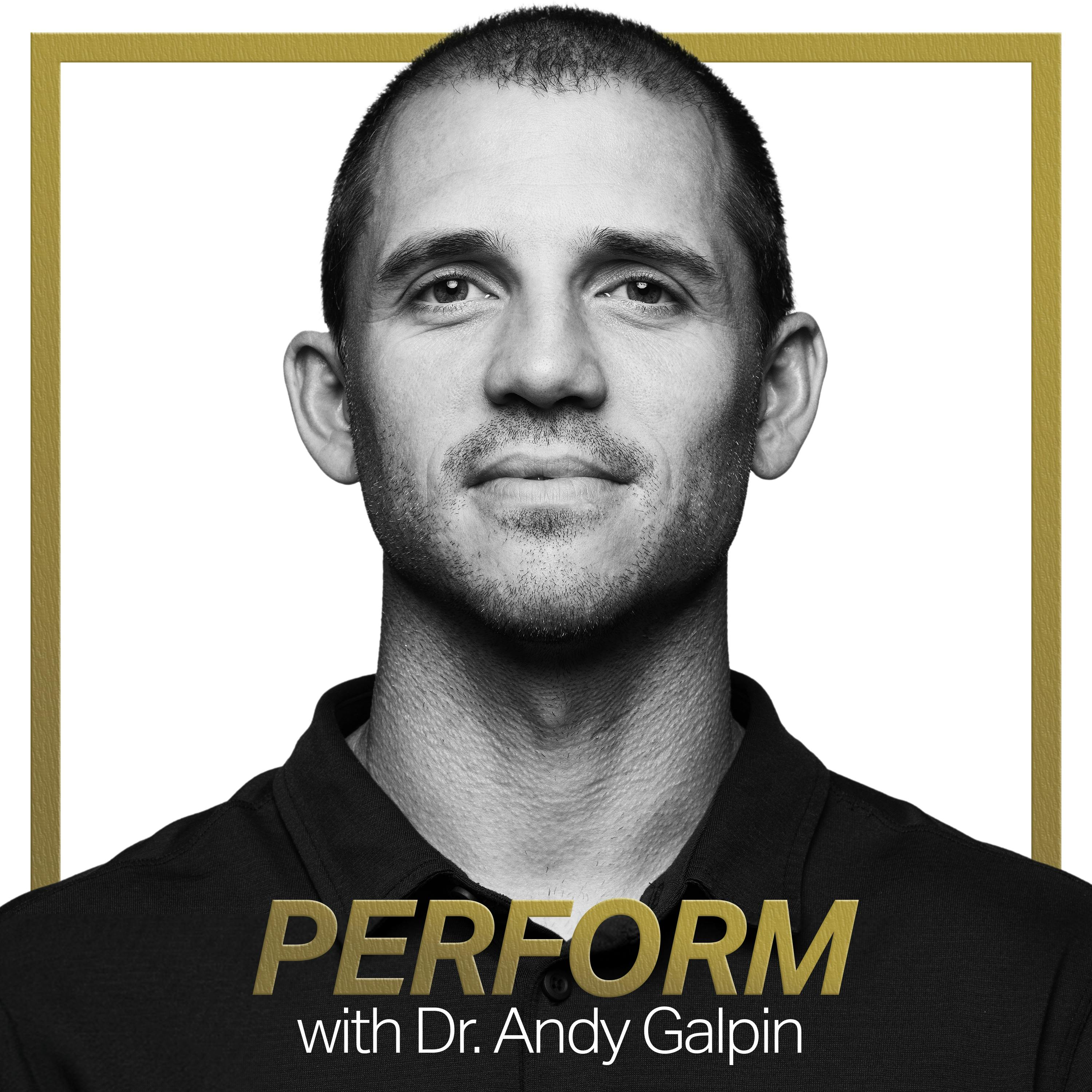
February 5, 2025 • 2hr 13min
How to Boost Your Metabolism & Burn Fat
Perform with Dr. Andy Galpin

Key Takeaways
- Metabolism is not about "speed" - it's about the total amount of cellular processes, not a rate that can be sped up or slowed down
- Total Daily Energy Expenditure (TDEE) has 4 key components:
- Exercise Activity Thermogenesis (EAT): 0-30% of TDEE
- Non-Exercise Activity Thermogenesis (NEAT): 5-30% of TDEE
- Thermal Effect of Food (TEF): 8-15% of TDEE
- Resting Metabolic Rate (RMR): 40-80% of TDEE
- NEAT is highly modifiable and one of the biggest differentiators between those who maintain weight easily vs those who gain weight easily
- Both acute and chronic factors influence metabolism - acute changes don't necessarily lead to long-term adaptations
- Sleep quality has a major impact on metabolism and body composition through multiple mechanisms
Introduction
In this episode, Dr. Andy Galpin breaks down the science of metabolism and addresses common misconceptions about "boosting" or "speeding up" metabolism. He explains that while you can't literally speed up metabolism, there are evidence-based ways to influence total daily energy expenditure and improve metabolic health.
Topics Discussed
Understanding Metabolism Basics (8:27)
Dr. Galpin explains that metabolism is not about speed but rather the total amount of cellular processes. He uses a car analogy - it's not about driving faster (speed) but rather driving more miles (total amount).
- Metabolism misconceptions come from confusing speed with total amount
- When people say "fast metabolism" they usually mean they can eat more without gaining weight
- The goal should be increasing total metabolic activity, not "speeding up" metabolism
- Body composition changes come from the balance between energy intake and output
Components of Total Daily Energy Expenditure (14:37)
Dr. Galpin breaks down the four main components that make up total daily energy expenditure:
- Exercise Activity Thermogenesis (EAT)
- Calories burned during structured exercise
- Represents 0-30% of total daily energy expenditure
- Most people burn 10-20% of daily calories through exercise
- Non-Exercise Activity Thermogenesis (NEAT)
- All physical activity outside of structured exercise
- Includes walking, fidgeting, standing, etc.
- Highly variable between individuals (5-30% of TDEE)
- Most modifiable component of metabolism
Thermal Effect of Food and Macronutrients (25:17)
The thermal effect of food varies significantly by macronutrient:
- Fat: 0-2% thermal effect
- Carbohydrates: 5-10% thermal effect
- Protein: 15-30% thermal effect
- Food preparation and processing affects thermal effect
- Higher protein intake can increase total daily energy expenditure through increased TEF
Resting Metabolic Rate vs Basal Metabolic Rate (31:11)
Dr. Galpin explains the difference between RMR and BMR:
- Basal Metabolic Rate (BMR)
- Minimum calories needed for basic functions
- Measured after 12-hour fast in controlled conditions
- More stable measure
- Resting Metabolic Rate (RMR)
- Actual calories burned at rest in normal conditions
- More variable and responsive to recent activities/intake
- Generally ranges from 1,000-3,000 calories per day
Acute Factors Affecting Metabolism (54:17)
Several factors can cause short-term changes in metabolic rate:
- Exercise type and intensity
- Endurance exercise burns more calories during activity
- High-intensity intervals create more post-exercise oxygen consumption
- Strength training preserves muscle mass during weight loss
- Environmental factors
- Cold exposure increases energy expenditure
- Spicy foods can temporarily increase metabolic rate
- Hydration status affects metabolism
- Dietary factors
- Caffeine increases RMR 3-11% for 1-3 hours
- Green tea extract increases RMR 4-5%
- Higher protein meals increase TEF
Chronic Adaptations and Long-Term Changes (1:37:18)
Dr. Galpin discusses factors that create lasting changes in metabolism:
- Sleep quality and quantity
- Poor sleep reduces fat loss by up to 55%
- Affects hormone regulation and hunger signals
- Impacts both acute and chronic metabolic function
- Muscle mass
- Each pound of muscle burns 6-10 calories per day
- Explains up to 80% of RMR differences between individuals
- Key factor in age-related metabolic changes
- Fish oil supplementation
- 3g/day can increase RMR by ~14%
- Improves body composition and fat oxidation
- Effects seen after 12 weeks of supplementation
Weight Loss Plateaus and Metabolic Adaptation (1:57:53)
As weight loss occurs, several adaptations take place:
- Decreased TEF due to lower food intake
- Reduced NEAT as body conserves energy
- Lower RMR from smaller body size and potential muscle loss
- Decreased EAT as less mass requires less energy to move
- Need to adjust strategy as these adaptations occur
Conclusion
Dr. Galpin emphasizes that while you can't literally "speed up" metabolism, you can influence total daily energy expenditure through multiple evidence-based strategies. The most effective approach combines several methods:
- Maintain or increase muscle mass through resistance training
- Optimize sleep quality and quantity
- Increase NEAT through daily movement
- Consider strategic supplementation (fish oil, etc.)
- Adjust nutrition to maximize TEF while maintaining adequate calories
- Account for metabolic adaptations during weight loss



